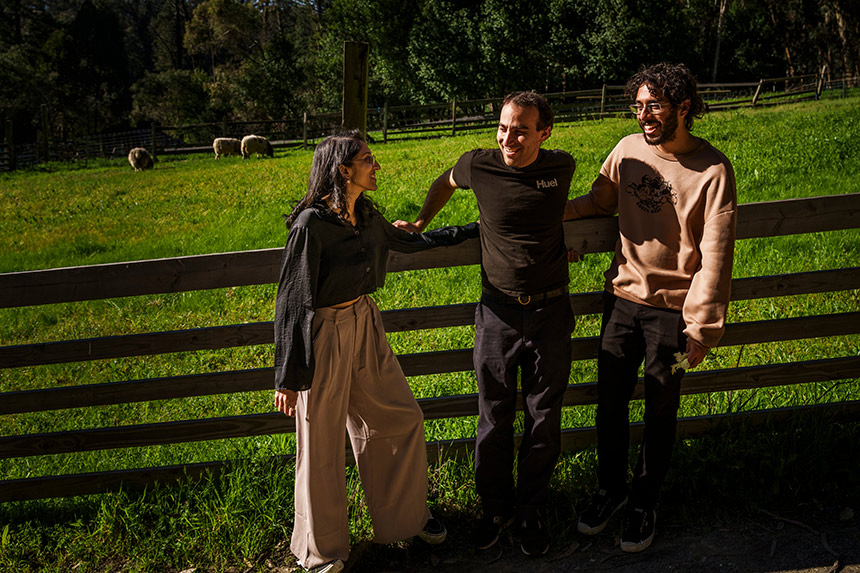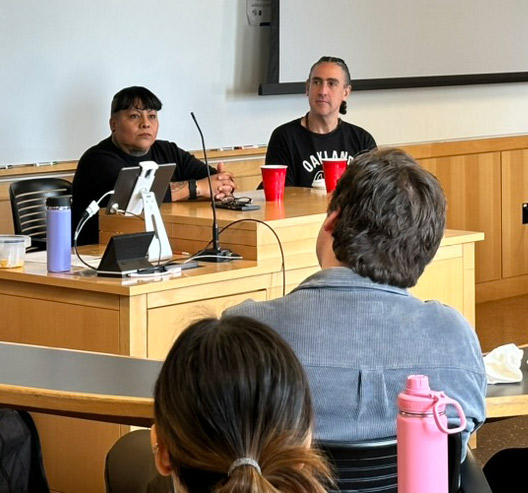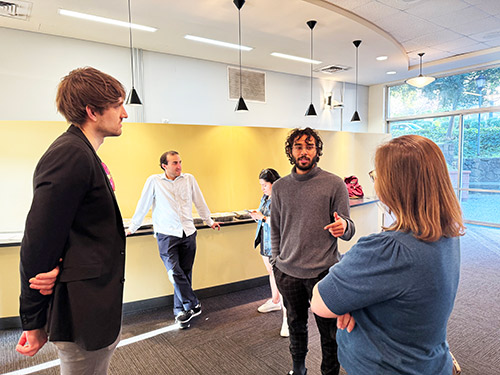
By Andrew Cohen
For 3L Taj Uppal, kickstarting Berkeley Law’s dormant Animal Legal Defense Fund (ALDF) soon after arriving on campus in Fall 2021 felt more like a calling than a decision.
“It breaks my heart to contemplate the vastness of animal suffering,” he says. “I see animal rights as the moral blindspot of our generation. Even in a progressive hub like Berkeley Law, the oppression experienced by nonhumans receives little to no attention. That frustrates me a lot, and I’m trying to change that.”

Fellow ALDF leaders, 2L Krishna Desai and 3L Abraham Brauner, have worked vigilantly with Uppal to broaden awareness of animal issues. Their Plant-Based Berkeley Law campaign is bringing this issue into the mainstream conversation, and a robust slate of programming highlights how these issues connect with other social justice concerns.
One recent example: an event focused on slaughterhouse labor with animal rights activist Susana Chavez, who worked in a slaughterhouse in Mexico as a teenager, and UC Berkeley School of Journalism Professor Andrés Cediel, who produced the acclaimed documentary “Trafficked in America.” The film chronicles a group of Guatemalan teens who were smuggled into America and forced to work on an Ohio egg farm.
ALDF also connects students to lawyers and careers in animal law through networking and other professional events. Brauner notes that the animal rights movement actively strives to learn strategies from previous social justice efforts, including the women’s suffrage and civil rights movements.
“Animal rights isn’t something we think about, in large part, due to the meat industry’s deliberate veil of secrecy, including unconstitutional ‘ag gag’ laws that prevent people from finding out about their atrocities,” he says. “Industry wants to keep this out of sight and out of mind, because they know the vast majority of people would be outraged if they found out.”
Regular revelations
When she came to Berkeley Law, Desai would scour the list of weekly lunch events and attended one with two animal activists who’d been on trial for rescuing piglets from a factory farm and were acquitted. She had no idea that one of them, Wayne Hsiung, a former Big Law attorney and law professor who left academia behind to engage in animal activism — breaking into factory farms, rescuing animals, and representing himself when arrested — was a lawyer.
“I realized that animal rights is more than just white people and veganism and controversial PETA campaigns,” Desai says. “And I remembered that being in law school is about more than just getting the best grades and all the gold stars and the big firm job.”

She now relishes seeing how concern for animal rights unite people regardless of differences in race, birthplace, or religion. While she hadn’t even heard about animal law until coming to Berkeley Law, she now finds it “just the kind of radical lawyering I came here wanting to do.”
An estimated 10 billion animals are slaughtered each year in the United States, 99% of them raised on factory farms, and Brauner cites their tortuous conditions as the group’s top concern. He asserts that America’s food system is built around this exploitation, but that when activists talk about it people often feel personally attacked about their own diets and judged for not being vegan.
“The climate movement has done a good job addressing this problem, and we’re trying to mimic their success,” Brauner says. “It’s clear that you can care about the environment and be an environmental activist and still drive a car, that the focus should be on systemic change, not individual sacrifice. Animal rights still struggles to achieve this distinction.”
Uppal echoes that in addressing speciesism, the assumption of human supremacy he says is used to justify animal abuse across society. “You don’t have to be vegetarian to be anti-speciesist … We must shift the focus away from the individual consumer and toward the underlying structural conditions that create animal exploitation.”
Finding the intersections
Working to transform institutions and create meaningful change through collective organization, Uppal points out that veganism is not accessible to everyone, some people have deterrent health issues, and others simply lack the bandwidth to adopt a new diet.
“This is precisely where the systemic perspective comes in,” he says, “We need to create a world where all of these incentives are reversed. We need to flip the social norms, expand plant-based nutrition, and put plant-based foods on every shelf of every grocery store. Only then will we be able to create a world where the default option is also the ethical option.”
Toward this end, the group collaborates and co-sponsors events with a wide range of student organizations that focus on the environment, migration, labor, and more.
“We’ve got to recognize these intersections because they’re where the magic happens,” Desai says. “By teaming up with folks fighting for other causes, we can tackle things from all angles. Animal rights does not exist in a bubble. It’s all tangled up with other social justice issues, and there are so many points of entry for advocates like us to build a better world.”
Before law school, Desai aided undocumented migrant laborers who worked at poultry plants in rural Mississippi, about an hour from her hometown. She describes seeing trucks packed with chickens and the workers’ harrowing depictions of their job environment — grueling labor, graphic tasks such as deboning and defeathering, and common sexual harassment.
For Brauner, ALDF provides a platform “to show how exploitation of animals is part of the same capitalist and colonial mechanisms that exploit people of color, poor people, people who aren’t men, people in developing countries, and the environment worldwide.” He adds, “The struggle for animal rights is part of the same struggles that so many in the Berkeley Law community care about.”